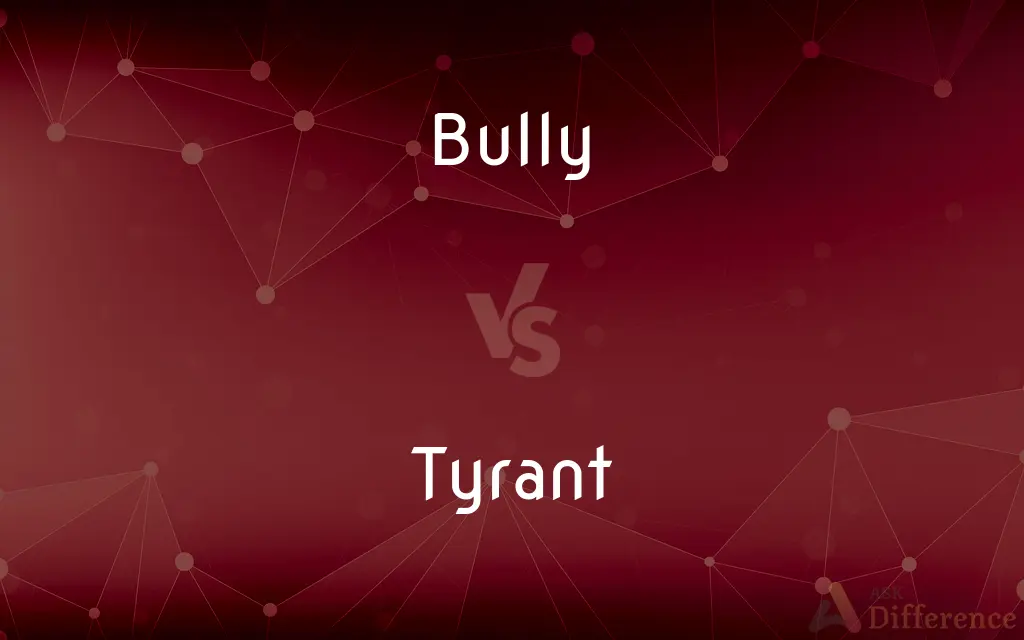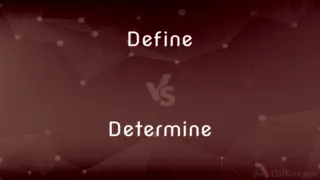Bully vs. Tyrant — What's the Difference?
By Urooj Arif & Maham Liaqat — Updated on April 21, 2024
Bully implies aggressive behavior often among peers to intimidate, whereas tyrant denotes an absolute ruler who uses power oppressively.

Difference Between Bully and Tyrant
Table of Contents
ADVERTISEMENT
Key Differences
A bully typically engages in repeated aggressive or intimidating actions towards individuals perceived as weaker, often in social settings like schools or workplaces. Whereas a tyrant exercises absolute power without legal right, often ruling a country or a large group with harsh and oppressive measures.
Bullying behavior can be verbal, physical, or psychological, aiming to assert dominance over others through fear and coercion. On the other hand, a tyrant's actions often impact a broader spectrum, including political and social oppression, and their methods can include severe punishments and authoritarian control.
Victims of bullies are usually individuals or smaller groups who may be vulnerable due to lesser physical strength, social status, or emotional resilience. Conversely, a tyrant's victims encompass entire populations or significant segments of a society, suffering from systemic abuse and a lack of freedom.
The motivation behind a bully’s actions often stems from personal insecurity, a desire for dominance, or social standing. In contrast, a tyrant is driven by a lust for power, control over a populace, and often, political objectives or the consolidation of power.
Responses to bullying typically involve social interventions, educational programs, and counseling, focusing on both the bully and the victims to foster better behaviors and support healing. In contrast, resisting a tyrant often requires organized political resistance, international intervention, or revolutionary movements to change the leadership.
ADVERTISEMENT
Comparison Chart
Scope
Individual or small groups
Entire populations
Methods
Intimidation, coercion
Oppressive governance
Motivation
Personal dominance, insecurity
Political power, control
Impact
Psychological, social harm
Widespread fear, oppression
Typical Response
Counseling, social interventions
Political resistance, revolution
Compare with Definitions
Bully
Someone who habitually intimidates or harasses others.
The school bully often targeted younger students.
Tyrant
Someone who has usurped sovereignty.
The ancient city fell into the hands of a tyrant.
Bully
A blustering, quarrelsome, overbearing person who habitually badgers and intimidates smaller or weaker people.
The manager was a bully to her team, often yelling over small mistakes.
Tyrant
A cruel and oppressive ruler.
The tyrant imposed high taxes and harsh punishments.
Bully
A person using strength or power to harm or intimidate those who are weaker.
She acted like a bully when she demanded their lunch money.
Tyrant
A person exercising power or control in a cruel, unreasonable, or arbitrary way.
His boss was a tyrant who expected everyone to work overtime without pay.
Bully
To use superior strength or influence to intimidate (someone), typically to force them to do something.
He bullied his way to the front of the line.
Tyrant
A ruler who seized power without legal right.
The tyrant took over the government after a military coup.
Bully
To frighten, hurt, or threaten (a smaller or weaker person).
The older player bullied the new team members into doing menial tasks.
Tyrant
A ruler who uses power oppressively or unjustly.
The tyrant was feared for his unpredictable acts of cruelty.
Bully
A person who habitually seeks to harm or intimidate those whom they perceive as vulnerable
He is a ranting, domineering bully
Tyrant
A tyrant (from Ancient Greek τύραννος, tyrannos), in the modern English usage of the word, is an absolute ruler who is unrestrained by law, or one who has usurped a legitimate ruler's sovereignty. Often portrayed as cruel, tyrants may defend their positions by resorting to repressive means.
Bully
Corned beef.
Tyrant
An extremely oppressive, unjust, or cruel ruler.
Bully
An act of starting play in field hockey, in which two opponents strike each other's sticks three times and then go for the ball.
Tyrant
An absolute ruler who governs without restrictions, especially one who seized power illegally.
Bully
Seek to harm, intimidate, or coerce (someone perceived as vulnerable)
A local man was bullied into helping them
Her 11- year-old son has been constantly bullied at school
Tyrant
An oppressive, harsh, arbitrary person
My boss is a tyrant.
Bully
(in field hockey) start play with a bully.
Tyrant
A usurper; one who gains power and rules extralegally, distinguished from kings elevated by election or succession.
Bully
Very good; excellent
The statue really looked bully
Tyrant
(obsolete) Any monarch or governor.
Bully
A person who is habitually cruel or overbearing, especially to smaller, weaker, less popular, or more vulnerable people.
Tyrant
A despot; a ruler who governs unjustly, cruelly, or harshly.
Bully
A hired ruffian; a thug.
Tyrant
(by extension) Any person who abuses the power of position or office to treat others unjustly, cruelly, or harshly.
Bully
A pimp.
Tyrant
(by extension) A villain; a person or thing who uses strength or violence to treat others unjustly, cruelly, or harshly.
Bully
(Archaic) A fine person.
Tyrant
The pl=s, members of the family Tyrannidae, which often fight or drive off other birds which approach their nests.
Bully
(Archaic) A sweetheart.
Tyrant
(uncommon) Tyrannical, tyrannous; like, characteristic of, or in the manner of a tyrant.
Bully
Canned or pickled beef. Also called bully beef.
Tyrant
To act like a tyrant; to be tyrannical.
Bully
To hurt or intimidate (someone) in the manner of a bully.
Tyrant
To tyrannize.
Bully
To make (one's way) aggressively.
Tyrant
An absolute ruler; a sovereign unrestrained by law or constitution; a usurper of sovereignty.
Bully
To behave like a bully.
Tyrant
Specifically, a monarch, or other ruler or master, who uses power to oppress his subjects; a person who exercises unlawful authority, or lawful authority in an unlawful manner; one who by taxation, injustice, or cruel punishment, or the demand of unreasonable services, imposes burdens and hardships on those under his control, which law and humanity do not authorize, or which the purposes of government do not require; a cruel master; an oppressor.
Love, to a yielding heart, is a king, but to a resisting, is a tyrant.
Bully
To force one's way aggressively or by intimidation
“They bully into line at the gas pump” (Martin Gottfried).
Tyrant
Any one of numerous species of American clamatorial birds belonging to the family Tyrannidæ; - called also tyrant bird.
Bully
Excellent; splendid
Did a bully job of persuading the members.
Tyrant
To act like a tyrant; to play the tyrant; be to tyrannical.
Bully
Used to express approval
Bully for you!.
Tyrant
A cruel and oppressive dictator
Bully
A person who is intentionally physically or emotionally cruel to others, especially to those whom they perceive as being vulnerable or of less power or privilege.
A playground bully pushed a girl off the swing.
I noticed you being a bully towards people with disabilities.
Tyrant
In ancient Greece, a ruler who had seized power without legal right to it
Bully
A noisy, blustering, tyrannical person, more insolent than courageous; one who is threatening and quarrelsome.
Tyrant
Any person who exercises power in a cruel way;
His father was a tyrant
Bully
A hired thug.
Bully
(uncountable) Bully beef.
Bully
(obsolete) A brisk, dashing fellow.
Bully
The small scrum in the Eton College field game.
Bully
Any of various small freshwater or brackishwater fish of the family Eleotridae; sleeper gobies. The common bully, Gobiomorphus cotidianus
Bully
An (eldest) brother; a fellow workman; comrade
Bully
(dialectal) A companion; mate male or female.
Bully
(obsolete) A darling, sweetheart male or female.
Bully
(field hockey) A standoff between two players from the opposing teams, who repeatedly hit each other's hockey sticks and then attempt to acquire the ball, as a method of resuming the game in certain circumstances.
Bully
(mining) A miner's hammer.
Bully
(transitive) To intimidate (someone) as a bully.
You shouldn't bully people for being weak.
Bully
(transitive) To act aggressively towards.
Bully
Very good.
A bully horse
Bully
Jovial and blustering.
Bully
Well done!
Bully, she's finally asked for that promotion!
Bully
A noisy, blustering fellow, more insolent than courageous, who threatens, intimidates, or badgers people who are smaller or weaker than he is; an insolent, tyrannical fellow.
Bullies seldom execute the threats they deal in.
Bully
A brisk, dashing fellow.
Bully
Pickled or canned beef.
Bully
Jovial and blustering; dashing.
Bully
Fine; excellent; as, a bully horse.
Bully
To intimidate or badger with threats and by an overbearing, swaggering demeanor; to act the part of a bully{1} toward.
For the last fortnight there have been prodigious shoals of volunteers gone over to bully the French, upon hearing the peace was just signing.
Bully
To act as a bully{1}.
Bully
Well done! Excellent!
Bully
A cruel and brutal fellow
Bully
Be bossy towards;
Her big brother always bullied her when she was young
Bully
Discourage or frighten with threats or a domineering manner; intimidate
Bully
Very good;
He did a bully job
A neat sports car
Had a great time at the party
You look simply smashing
Common Curiosities
What defines a bully?
A bully is defined as someone who intimidates or harasses others, often using physical strength or social power to exert control.
Can a bully become a tyrant?
While both share a desire for control, the escalation from personal intimidation to ruling with oppressive power over a large group is rare but possible.
What drives a person to become a bully?
Insecurity, a need for dominance, or societal influences can drive a person to become a bully.
What is a tyrant?
A tyrant is a ruler who holds absolute power through cruel and unjust methods.
How do bullies and tyrants differ in their approach?
Bullies use personal intimidation to dominate individuals, while tyrants control and oppress entire populations.
How can society respond to bullies and tyrants?
Responses to bullies often involve personal and social interventions, while opposing a tyrant may require collective and political action.
Can intervention programs change bully behavior?
Yes, many intervention programs are effective in changing bully behavior by addressing underlying psychological and social issues.
What are typical punishments for a bully?
Punishments for bullies can include counseling, social sanctions, or disciplinary actions in educational or professional settings.
What consequences do tyrants face?
Tyrants may face overthrow, international legal action, or assassination.
How do historical contexts of bullies and tyrants differ?
Bullies are a persistent element in human interactions and social groupings, whereas tyrants often emerge during significant historical upheavals or power vacuums.
How do victims respond to bullies and tyrants?
Victims of bullies often seek help through authority figures or social support, whereas victims of tyrants may require broader societal or international support.
Is bullying a social or individual problem?
Bullying is primarily a social problem that manifests in individual actions and can affect community dynamics.
How does tyranny affect a country?
Tyranny can lead to widespread fear, economic downfall, and a general decline in the quality of life and freedom.
What leads to the rise of a tyrant?
Political instability, lack of democratic institutions, and public discontent can pave the way for a tyrant to rise to power.
What motivates a tyrant?
A tyrant is usually motivated by a desire for absolute power and often, personal gain at the expense of others’ freedoms.
Share Your Discovery

Previous Comparison
Define vs. Determine
Next Comparison
Abscissa vs. OrdinateAuthor Spotlight
Written by
Urooj ArifUrooj is a skilled content writer at Ask Difference, known for her exceptional ability to simplify complex topics into engaging and informative content. With a passion for research and a flair for clear, concise writing, she consistently delivers articles that resonate with our diverse audience.
Co-written by
Maham Liaqat














































